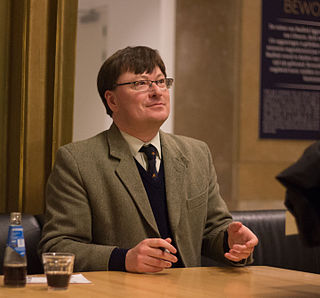Top 772 Rome Quotes & Sayings - Page 13
Explore popular Rome quotes.
Last updated on April 15, 2025.
Books are special, books are the way we talk to generations that have not turned up yet. The fact that we can actually, essentially communicate with the people in ancient Egypt, people in Rome and Greece, people in ancient Britain, people in New York in the 1920s who can communicate to us and change the way we think, and change the things that we believe. I think that books are special. Books are sacred. And I think that when you are selling books, you have to remember that in all the profits and loss, in all of that, you are treading on sacred ground.
Nothing lasts forever, whether it's Greece, Rome or the British Empire. It doesn't mean that America has to end. The country could be reshaped and reimagined in a way that is even more democratic and less imperial in nature. We're trying to radically reshape the nation in ways that are more just and fairer. That's what I mean when I say that empires eventually fall. I'm not calling for the end of America. I'm just calling for a reimagination of its democratic possibilities.
On this question of principle, while actual suffering was yet afar off, they [the Colonies] raised their flag against a power to which, for purposes of foreign conquest and subjugation, Rome in the height of her glory is not to be compared,-a power which has dotted over the surface of the whole globe with her possessions and military posts, whose morning drum-beat, following the sun, and keeping company with the hours, circles the earth with one continuous and unbroken strain of the martial airs of England.
For stories teach us, that liberty sought out of season, in a corrupt and degenerate age, brought Rome itself to a farther slavery: for liberty hath a sharp and double edge, fit only to be handled by just and virtuous men; to bad and dissolute, it becomes a mischief unwieldy in their own hands: neither is it completely given, but by them who have the happy skill to know what is grievance and unjust to a people, and how to remove it wisely; what good laws are wanting, and how to frame them substantially, that good men may enjoy the freedom which they merit, and the bad the curb which they need.
Mother of Rome, delight of Gods and men,
Dear Venus that beneath the gliding stars
Makest to teem the many-voyaged main
And fruitful lands- for all of living things
Through thee alone are evermore conceived,
Through thee are risen to visit the great sun-
Before thee, Goddess, and thy coming on,
Flee stormy wind and massy cloud away,
For thee the daedal Earth bears scented flowers,
For thee waters of the unvexed deep
Smile, and the hollows of the serene sky
Glow with diffused radiance for thee!
Traveling is a fool's paradise. Our first journeys discover to us the indifference of places. At home I dream that at Naples, at Rome, I can be intoxicated with beauty, and lose my sadness. I pack my trunk, embrace my friends, embark on the sea, and at last wake up in Naples, and there beside me is the stern fact, the sad self, unrelenting, identical, that I fled from. I seek the Vatican, and the palaces. I affect to be intoxicated with sights and suggestions, but I am not intoxicated. My giant goes with me wherever I go.
When we affect to condemn savages, we should remember that by doing so we asperse our own progenitors; for they were savages also.Who can swear that among the naked British barbarians sent to Rome to be stared at more than 1500 years ago, the ancestor of Bacon might not have been found?--Why, among the very Thugs of India, or the bloody Dyaks of Borneo, exists the germ of all that is intellectually elevated and grand. We are all of us--Anglo-Saxons, Dyaks and Indians--sprung from one head and made in one image.
And yes,Percy,of course they are now in our United States. Look at your symbol,the eagle of Zeus. Look at the statue of Prometheus in Rockefeller Center,the Greek facades of our government builidings in Washington. I defy you to find any American city where the Olympians are not proeminently displayed, in multiple places. Like it or not-and believe me,plenty of people weren't very found of Rome,either-America is now the heart of the flame. It is the great power of the West.And so Olympus is here.And we are here.
Our patriotism comes straight from the Romans. This is why French children are encouraged to seek inspiration for it in Corneille. It is a pagan virtue, if these two words are compatible. The word pagan, when applied to Rome, early possesses the significance charged with horror which the early Christian controversialists gave it. The Romans really were an atheistic and idolatrous people; not idolatrous with regard to images made of stone or bronze, but idolatrous with regard to themselves. It is this idolatry of self which they have bequeathed to us in the form of patriotism.
Our understanding of early Christian beginnings is usually monolithic. It is much determined by the Acts of the Apostles, which pictures a straightforward development from the primitive community in Jerusalem founded on Pentecost to the world-wide mission of Paul climaxing with his arrival in Rome, the political centre of the Greco-Roman world. The Pauline epistles are understood not so much as historical sources reflecting a much more multifaceted early Christian situation fraught with tensions but as theological treatises expounding and defending the doctrine of justification by faith.
Taking on all at once Germany, Japan, and Italy - diverse enemies all - did not require the weeding out of all the fascists and their supporters in Mexico, Argentina, Eastern Europe, and the Arab world. Instead, those in jackboots and armbands worldwide quietly stowed all their emblems away as organized fascism died on the vine once the roots were torn out in Berlin, Rome, and Tokyo. So too will the terrorists, once their sanctuaries and capital shrivel up - as is happening as we speak.
Great lecturers seldom hesitate to use dramatic tricks to enshrine their precepts in the minds of their audiences, and at Yale perhaps Chauncey B. Tinker was the most noted. To read one of his lectures was like reading a monologue of the great actress Ruth Draper--you missed the main point. You missed the drop in his voice as he approached the death in Rome of the tubercular Keats; you missed the shaking tone in which he described the poet's agony for the absent Fanny with him his love had never been consummated; you missed the grim silence of the end.
Getting ahead in a difficult profession - singing, acting, writing, whatever requires avid faith in yourself. You must be able to sustain yourself against staggering blows and unfair reversals. When I think back to those first couple of years in Rome, those endless rejections, without a glimmer of encouragement from anyone, all those failed screen tests, and yet I never let my desire slide away from me, my belief in myself and what I felt I could achieve.
Individual Moslems may show splendid qualities. Thousands become the brave and loyal soldiers of the Queen: all know how to die: but the influence of the religion paralyses the social development of those who follow it. No stronger retrograde force exists in the world. Far from being moribund, Mohammedanism is a militant and proselytizing faith. It has already spread throughout Central Africa, raising fearless warriors at every step; and were it not that Christianity is sheltered in the strong arms of science, the science against which it had vainly struggled, the civilisation of modern Europe might fall, as fell the civilisation of ancient Rome.
In our own times, you see, an emperor came to the city of Rome, where there's the temple of an emperor, where there's a fisherman's tomb. And so that pious and Christian emperor, wishing to beg for health, for salvation from the Lord, did not proceed to the temple of a proud emperor, but to the tomb of a fisherman, where he could imitate that fisherman in humility, so that he, being thus approached, might then obtain something from the Lord, which a haughty emperor would be quite unable to earn.
At Rome there were nothing even vaguely resembling modern political parties - although given the stifling impact of these, this may well have made it more rather than less democratic than many countries today - and each candidate for office competed as an individual. Only rarely did they advocate specific policies, although commenting on issues of current importance was more common. In the main voters looked more for a capable individual who once elected could do whatever the State required.
In a bygone era, penalty-takers would put their laces through the ball and threaten to put a permanent bulge in the netting. For reasons that remain a mystery, the modern preference is for side-footed placement and so the dilemma of goalkeepers has changed from whether to take a guess at dive right or left to if they should dive at all. Or at least that ought to have been their reappraisal. Almunia was feted as the hero in Rome but had he and Doni stayed in the centre of their goal then the number of saves they made in the shoot-out would have been doubled.
Can you see air you breathe? Can you see the force that moves the tides or changes the seasons or sends the birds to a winter haven?" Her eyes welled. "Can Rome with all its knowledge be so foolish? Oh Marcus, you can't carve God in stone. You can't limit him to a temple. You can't imprison him on a mountaintop. Heaven is his throne; earth, his footstool. Everything you see is his. Empires will rise and empires will fall. Only God prevails.
I never thought I'd get to see Rome," Hazel said. "When I was alive, I mean for the first time, Mussolini was in charge. We were at war." "Mussolini?" Leo frowned. "Wasn't he like BFF's with Hitler?" Hazel stared at him like he was an alien. "BFF's?" "Never mind." "I'd love to see the Trevi Fountain," she said. "There's a fountain on every block," Leo grumbled. "Or the Spanish Steps," Hazel said. "Why would you come to Italy to see Spanosh steps?" Leo asked. "That's like going to China for Mexican food, isn't it?" "You're hopeless," Hazel complained. "So I've been told.
Western societies from ancient Athens to imperial Rome to the French republic rarely collapsed because of a shortage of resources or because foreign enemies proved too numerous or formidable in arms - even when those enemies were grim Macedonians or Germans. Rather, in times of peace and prosperity there arose an unreal view of the world beyond their borders, one that was the product of insularity brought about by success, and an intellectual arrogance that for some can be the unfortunate byproduct of an enlightened society.
Listen, are we helpless? Are we doomed to do it again and again and again? Have we no choice but to play the Phoenix in an unending sequence of rise and fall? Assyria, Babylon, Egypt, Greece, Carthage, Rome, the Empires of Charlemagne and the Turk: Ground to dust and plowed with salt. Spain, France, Britain, America—burned into the oblivion of the centuries. And again and again and again. Are we doomed to it, Lord, chained to the pendulum of our own mad clockwork, helpless to halt its swing? This time, it will swing us clean to oblivion.
To Helen Helen, thy beauty is to me Like those Nicean barks of yore That gently, o'er a perfumed sea, The weary, way-worn wanderer bore To his own native shore. On desperate seas long wont to roam, Thy hyacinth hair, thy classic face, Thy Naiad airs have brought me home To the glory that was Greece, And the grandeur that was Rome. Lo, in yon brilliant window-niche How statue-like I see thee stand, The agate lamp within thy hand, Ah! Psyche, from the regions which Are Holy Land!
My fellow Americans: Last night when I spoke with you about the fall of Rome, I knew at that moment that the troops of the United States and our allies were crossing the channel in another and greater operation. It has come to pass with success thus far. And so, in this poignant hour, I ask you to join me in prayer:
Almighty God: Our sons, pride of our nation, this day have set upon a mighty endeavor, a struggle to preserve our Republic, our religion, and our civilization. . .
English literature, from the days of the minstrels to the Lake Poets,--Chaucer and Spenser and Milton, and even Shakespeare, included,--breathes no quite fresh and, in this sense, wild strain. It is an essentially tame and civilized literature, reflecting Greece and Rome. Her wildness is a greenwood, her wild man a Robin Hood. There is plenty of genial love of Nature, but not so much of Nature herself. Her chronicles inform us when her wild animals, but not the wild man in her, became extinct.
Every spirit builds itself a house; and beyond its house a world; and beyond its world, a heaven. Know then, that the world exists for you. For you is the phenomenon perfect. What we are, that only can we see. All that Adam had, all that Caesar could, you have and can do. Adam called his house, heaven and earth; Caesar called his house, Rome; you perhaps call yours, a cobler's trade; a hundred acres of ploughed land; or a scholar's garret. Yet line for line and point for point, your dominion is as great as theirs, though without fine names. Build, therefore, your own world.
See yonder thin column of smoke curling up through the woods from some invisible farmhouse, the standard raised over some rural homestead.... It is a hieroglyphic of man's life, and suggests more intimate and important things than the boiling of a pot. Where its fine column rises above the forest, like an ensign, some human life has planted itself,--and such is the beginning of Rome, the establishment of the arts, and the foundation of empires, whether on the prairies of America or the steppes of Asia.
Strip back the beliefs pasted on by governesses, schools, and states, you find indelible truths at one's core. Rome'll decline and fall again, Cortés'll lay Tenochtitlán to waste again, and later, Ewing will sail again, Adrian'll be blown to pieces again, you and I'll sleep under the Corsican stars again, I'll come to Bruges again, fall in and out of love with Eva again, you'll read this letter again, the sun'll grow cold again. Nietzsche's gramophone record. When it ends, the Old One plays it again, for an eternity of eternities.
We discovered, like infants opening their eyes for the first time, that God's coming upon earth out of love for us had radically changed the world, because he had remained with us. As we walked about the city, or traveled to different cities and countries, it was not the beautiful and interesting things around us that attracted us. Not even Rome's wonderful monuments and precious relics seemed so important. Rather, what gave a sense of continuity to our journeying through the world for Jesus, was His Eucharistic presence in the tabernacles we found wherever we went.
An armed republic submits less easily to the rule of one of its citizens than a republic armed by foreign forces. Rome and Sparta were for many centuries well armed and free. The Swiss are well armed and enjoy great freedom. Among other evils caused by being disarmed, it renders you contemptible. It is not reasonable to suppose that one who is armed will obey willingly one who is unarmed; or that any unarmed man will remain safe among armed servants.
In Rome, I really wanted an Audrey Hepburn Roman Holiday experience, but the Trevi Fountain was crowded, there was a McDonald's at the base of the Spanish Steps, and the ruins smelled like cat pee because of all the strays. The same thing happened in Prague, where I'd been yearning for some of the bohemianism of The Unbearable Lightness of Being. But no, there were no fabulous artists, no guys who looked remotely like a young Daniel Day-Lewis. I saw this one mysterious-looking guy reading Sartre in a cafe, but then his cell phone rang and he started talking in aloud Texan twang.
Although it has been fashionable to deny it, anti-slavery doctrines began to appear in Christian theology soon after the decline of Rome and were accompanied by the eventual disappearance of slavery in all but the fringes of Christian Europe. When Europeans subsequently instituted slavery in the New World, they did so over strenuous papal opposition, a fact that was conveniently 'lost' from history until recently. Finally, the abolition of New World slavery was initiated and achieved by Christian activists.
The man who will go where his colors go, without asking, who will fight a phantom foe in the jungle and mountain range, without counting, and who will suffer and die in the midst of incredible hardship, without complaint, is still what he has always been, from Imperial Rome to sceptered Britain to democratic America. He is the stuff of which legions are made. His pride is in his colors and his regiment, his training hard and thorough and coldly realistic, to fit him for what he must face and his obedience is to his orders. He has been called United States Marine.
This book will expose the sins of the fathers and the vicious abuse of the Jewish people. 'In Defense of Israel' will shake Christian theology. It scripturally proves that the Jewish people as a whole did not reject Jesus as Messiah. It will also prove that Jesus did not come to earth to be the Messiah. It will prove that there was a 'Calvary conspiracy' between Rome, the high priest, and Herod to execute Jesus as an insurrectionist too dangerous to live. Since Jesus refused by word and deed to claim to be the Messiah, how can the Jews be blamed for rejecting what was never offered?
An important Italian critic once gave Fistful of Dollars a very bad review when it came out. Then he went to the university here [Rome] with Once Upon a Time in America. We showed it to 10,000 students. And while the man was speaking that day to the students, with me present, he said, "I have to state one thing. When I gave that review about Sergio's films, I should have taken into account that on Sergio Leone's passport, there should not be written whether the nationality is Italian or anything else. What should be written is: 'Nationality: Cinema.' "
At last, in the gray dawn of Civilization the fire in the Soul dies down. The dwindling powers rise to one more, half-successful, effort of creation, and produce the Classicism that is common to all dying Cultures. The soul thinks once again, and in Romanticism looks back piteously to its childhood; then finally, weary, reluctant, cold, it loses its desire to be, and, as in Imperial Rome, wishes itself out of the overlong daylight and back in the darkness of protomysticism in the womb of the mother in the grave.
They would find this House of Hades. They'd take the Doors of Death. And by the gods, if Leo had to design a grabber arm long enough to snatch Percy and Annabeth out of Tartarus, then that's what he would do. Nemesis wanted him to wreak vengeance on Gaea? Leo would be happy to oblige. He was going to make Gaea sorry she had ever messed with Leo Valdez. "Yeah." He took one last look at the cityscape of Rome, turning bloodred in the sunset. "Festus, raise the sails. We've got some friends to save.
Admit that the press transferred the pontificate of Rome to Henry VIII-Admit that the press demolished in some sort the feudal system, and set the serfs and villains free; admit that the press demolished the monasteries, nunneries, and religious houses; into whose hands did all these alienated baronies, monasteries, and religious houses and lands fall? Into the hands of the democracy? Into the hands of serfs and villains? Serfs and villains were the only real democracy in those time. No. They fell into the hands of other aristocrats. . . .
The great intellectual tradition that comes down to us from the past was never interrupted or lost through such trifles as the sack of Rome, the triumph of Attila, or all the barbarian invasions of the Dark Ages. It was lost after the introduction of printing, the discovery of America, the founding of the Royal Society, and all the enlightenment of the Renaissance and the modern world. It was there, if anywhere, that there was lost or impatiently snapped the long thin delicate thread that had descended from distant antiquity; the thread of that unusual human hobby: the habit of thinking.
Everyone aimed at security: no one accepted responsibility. What was plainly lacking, long before the barbarian invasions had done their work, long before economic dislocations became serious, was inner go. Rome’s life was now an imitation of life: a mere holding on. Security was the watchword – as if life knew any other stability than through constant change, or any form of security except through a constant willingness to take risks
Nowadays when a poet with one privately printed book can have his next three years taken care of by a Guggenheim fellowship, a Kenyon Review fellowship, and the Prix de Rome, it is hard to remember what chances the poet took in that small-town world, how precariously hand-to-mouth his existence was. And yet in one way the old days were better; [Vachel] Lindsay after a while, by luck and skill, got far more readers than any poet could get today.
"From the reign of Nero to that of Antoninus Pius," Gibbon says again, "the Jews discovered a fierce impatience of the dominion of Rome which repeatedly broke out in the most furious massacres and insurrections. Humanity is shocked at the recital of the horrid cruelties which the Jews committed in the cities of Egypt, of Cyprus, and of Cyrene, where they dwelt in treacherous friendship with the unsuspecting natives...In Cyrene they massacred 220,000 Greeks; in Cyprus 240,000; in Egypt a very great multitude. Many of these unhappy victims were sawed asunder..."
My point is that this Potter business has legs. It will run and run, and we must be utterly mad, as a country, to leave it to the Americans to make money from a great British invention. I appeal to the children of this country and to their Potter-fiend parents to write to Warner Bros and Universal, and perhaps, even, to the great J K herself. Bring Harry home to Britain-and if you want a site with less rainfall than Rome, with excellent public transport, and strong connections to Harry Potter, I have just the place.
The two principles referred to are Authority and Liberty, and the names of the two schools of Socialistic thought which fully and unreservedly represent one or the other of them are, respectively, State Socialism and Anarchism. Whoso knows what these two schools want and how they propose to get it understands the Socialistic movement. For, just as it has been said that there is no half-way house between Rome and Reason, so it may be said that there is no half-way house between State Socialism and Anarchism.
In 1968 I ran into Steve Lacy on the street in Rome. I took out my pocket tape recorder and asked him to describe in fifteen seconds the difference between composition and improvisation. He answered: "In fifteen seconds the difference between composition and improvisation is that in composition you have all the time you want to decide what to say in fifteen seconds, while in improvisation you have fifteen seconds." His answer lasted exactly fifteen seconds.
I think people try to make the most of their time on earth and also to fix their time on earth. They try to fix external verities, things that are true for all time, ideas that are true for all time: Rome will last forever! America will last forever! Beauty, as defined by the fashion industry, is one of those things—this is beautiful. This will always be beautiful—and hold it in a way that has some sense of permanence about it, and absoluteness. And yet it’s not.
He beat back the Greeks and reclaimed Rome for our people. Indeed, he was the one who destroyed the Macedonian threat and who single-handedly annihilated the greatest Greek general who had ever lived. Kyrian of Thrace.” Real hatred gleamed in his eyes, but she wasn’t sure who it was meant for. His grandfather or Kyrian. “You mean Kyrian Hunter?” she asked. “The guy with the minivan who lives a few blocks over?” Valerius’s eyes sparked at that. “He’s driving a minivan?” There was no mistaking the humor in his tone.
Rome wasn't built in a day, and we won't replace fossil fuels with clean energy based on the events of a single week, either. But the important thing to remember is that, once they happen, clean energy victories are irreversible. No one will tear down wind farms because they are nostalgic for fracking in our watersheds. And nobody will pull down their solar panels because they miss having mercury in their tuna or asthma inhalers for their kids. Because once we leave fossil fuels behind, we are never going back.
Great cycles of history began with vigorous cultures awakening to the needs of children, but collapsing with frayed family ties. Have we failed to learn lessons which Ancient China, Greece and Rome learned too late - about day care and death houses for old folks? Do we without protest accept accelerating preschool and nursing home cultures which warn ominously that the earlier you institutionalize your child, the earlier he will institutionalize you!
I think what I've tried to do is make the world a better place. I think that's what's really important. Nobody remembers who sold the most togas in Rome. In terms of legacy, people remember the great villains more than they remember the great heroes. So I think how you feel about yourself is the most significant question. What do you say about yourself when you put your head on the pillow? Are you really proud of what you're doing and the way you're doing it? I think it's really a fundamental question.
Rome tolerated every abominable practice, embraced every foul idea in the name of freedom and the rights of the common man. Citizens no longer carried on deviant behavior in private, but pridefully displayed it in public. It was those with moral values who could no longer freely walk in a public park without having to witness a revolting display. What happened to the public censors who protected the majority of citizenry from moral decadence? Did freedom have to mean abolishing common decency? Did freedom mean anyone could do anything they wanted anytime they wanted, without consequences?
Relationships are like Rome -- difficult to start out, incredible during the prosperity of the 'golden age', and unbearable during the fall. Then, a new kingdom will come along and the whole process will repeat itself until you come across a kingdom like Egypt... that thrives, and continues to flourish. This kingdom will become your best friend, your soul mate, and your love.













































